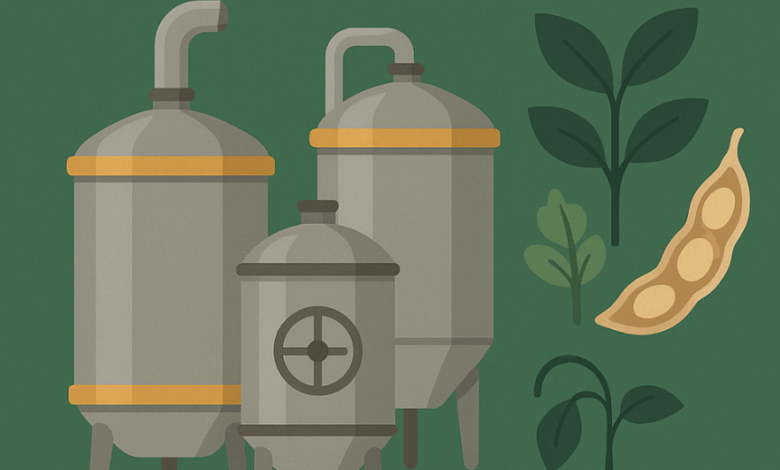Fermentation Vessels for Plant-Based Protein Products

As the demand for sustainable and nutritious food alternatives grows, plant-based protein products are emerging as one of the most innovative and promising categories in the food industry. From mycoprotein and tempeh to precision-fermented dairy and meat analogs, fermentation plays a central role in creating functional, flavorful, and protein-rich foods without relying on animal sources.
But behind every successful plant-based product is a well-engineered fermentation vessel. Choosing the right fermentation equipment ensures process efficiency, microbial control, and product consistency—all of which are crucial for scaling production while maintaining quality.
This article explores the role of fermentation vessels in plant-based protein manufacturing, types of equipment used, design considerations, industry use cases, and why stainless steel is the go-to material. Whether you’re launching a new fermentation startup or scaling an alt-protein facility, here’s what you need to know.
The Role of Fermentation in Plant-Based Protein Production
Fermentation in this context refers to the controlled growth of microbes (bacteria, fungi, or yeasts) to transform plant-derived substrates into high-protein, bioavailable food products. Depending on the type of fermentation, the goals can range from flavor enhancement to nutritional enrichment and texture development.
Key Applications:
- Mycoprotein (e.g., Quorn): Grown via fungal fermentation (Fusarium venenatum)
- Tempeh & Fermented Soy: Solid-state fermentation using Rhizopus oryzae
- Precision Fermentation: Microbial production of casein, whey, egg proteins, or heme
- Single-Cell Protein (SCP): Fermentation of algae, yeast, or bacteria for protein-rich biomass
- Fermented Pea or Soy Proteins: To enhance digestibility, reduce off-flavors, and improve bioavailability
Each application demands specific conditions for oxygenation, temperature, pH, and nutrient feeding—making the fermentation vessel a critical factor in success.
Types of Fermentation Vessels Used in Plant-Based Protein Manufacturing
Different types of fermentation processes require different vessel configurations. Here’s an overview:
1. Stirred Tank Reactors (STRs)
- Most common vessel for liquid or submerged fermentation
- Features agitators, baffles, and spargers for uniform mixing and oxygen transfer
- Suitable for bacteria, yeast, and fungi
Use Case: Producing mycoprotein, precision-fermented proteins, and SCP
2. Airlift Fermenters
- Gas is injected into the bottom, creating circulation without mechanical agitation
- Gentle on shear-sensitive organisms
- Lower energy consumption than STRs
Use Case: Microalgae or sensitive bacterial strains
3. Solid-State Fermenters
- Used for fermentation on moist solids without free-flowing water
- May be tray-based or rotary drum-based
- Require careful humidity and temperature control
Use Case: Tempeh, koji, and fermented soy products
4. Bioreactors with CIP & SIP Systems
- Clean-in-place (CIP) and steam-in-place (SIP) functionality is essential for food safety and process efficiency
- Ideal for industrial-scale production and frequent batch changes
Use Case: Precision fermentation of dairy or meat analog ingredients
Essential Features of Fermentation Vessels for Plant Proteins
To ensure success, plant-based protein producers need to consider the following when choosing or designing fermentation vessels:
1. Material of Construction
- 304 or 316L stainless steel: Standard for food-grade, corrosion-resistant, and non-reactive surfaces
- Smooth, polished internal surfaces prevent biofilm buildup
2. Agitation and Mixing
- Variable-speed agitators with low shear designs
- Baffles and impellers for homogeneous mixing
- Gas sparging for aerobic fermentation
3. Temperature and pH Control
- Glycol or steam jackets for heating/cooling
- Probes and feedback loops for real-time monitoring
4. Aeration and Oxygen Transfer
- Aerobic fermentation requires high oxygen transfer rates (OTR)
- Vessels must support efficient gas dispersion and ventilation
5. Sterilization and Cleanability
- CIP/SIP systems reduce downtime and microbial risk
- Easy access ports and manways for manual inspection
6. Scalability and Modular Design
- Modular skid-mounted systems allow scale-up with minimal disruption
- Compatibility with process automation and SCADA systems
Stainless Steel: The Preferred Material for Fermentation Vessels
Stainless steel is the gold standard in fermentation vessel construction due to its strength, durability, and hygienic properties.
Benefits:
- Corrosion Resistance: Handles acids, salts, and cleaning agents without degradation
- Sanitary Finish: Non-porous surface reduces risk of contamination
- High Durability: Withstands pressurization, thermal cycling, and continuous use
- Easy to Clean: Supports CIP systems and manual sanitation
- Regulatory Compliance: Meets global food safety standards (FDA, 3-A, CE, etc.)
Whether you’re producing SCP in a stirred tank or fermenting soy in a tray fermenter, stainless steel ensures safety, consistency, and operational efficiency.
Industry Case Studies: Fermentation in Action
1. Mycoprotein Manufacturing (e.g., Quorn)
- Uses large aerobic stirred-tank bioreactors
- Requires precise aeration, agitation, and pH monitoring
- High foam potential managed with antifoaming ports
2. Precision Fermented Dairy Proteins
- Fermentation of genetically engineered microbes (e.g., Perfect Day)
- Requires sterile conditions and advanced bioreactor control
- Needs pressurized vessels for post-fermentation processing
3. Tempeh and Fermented Soy Production
- Solid-state fermentation in shallow trays or stacked cabinets
- Requires high humidity and controlled temperature
- Stainless steel trays prevent mold contamination and ensure longevity
How to Choose the Right Fermentation Vessel for Your Operation
When selecting a fermentation vessel for plant-based protein production, consider the following:
1. Your Fermentation Type
- Aerobic or anaerobic?
- Submerged or solid-state?
- Batch or continuous?
2. Organism and Sensitivity
- Shear sensitivity (e.g., filamentous fungi)
- pH or oxygen requirements
3. Scale and Batch Size
- Pilot (5–100L), mid-size (100–2,000L), or industrial (5,000L+)?
- Do you need scalability options?
4. Cleaning and Compliance Needs
- Will you need CIP/SIP capabilities?
- Do you require certifications (e.g., ASME, CE, FDA)?
5. Integration with Your Facility
- Available footprint and ceiling height
- Utility access for glycol, steam, or air
- Compatibility with automation or downstream processing
Why Micet Is a Trusted Fermentation Vessel Manufacturer for Plant-Based Proteins
Micet is a globally recognized manufacturer of stainless steel fermentation tanks and bioreactors, with extensive experience in the alt-protein and food tech sectors.
What Sets Micet Apart:
- Custom-engineered vessels for mycoprotein, SCP, dairy alternatives, and more
- 304/316L stainless steel with polished interiors and sanitary welds
- CIP and SIP-ready designs for food safety compliance
- Skid-mounted modular systems for scalability
- Global certifications: CE, ASME, FDA-compliant
Whether you’re producing fermentation-derived heme for a plant-based burger or launching a probiotic protein beverage, Micet’s equipment is designed to support your process from pilot scale to full commercialization.
See also The Role and Importance of a Criminal Defense Lawyer
FAQs
Q1: Can the same fermentation vessel be used for different types of plant-based proteins?
It depends. While some vessels are flexible, cross-contamination risk and varying process requirements (e.g., aeration, agitation) may necessitate dedicated equipment.
Q2: What size fermentation tank should I start with for plant protein R&D?
Pilot-scale vessels between 50 and 200 liters are ideal for R&D and proof-of-concept testing before scaling up to larger production volumes.
Q3: Are there regulatory requirements for fermentation tanks used in food production?
Yes. Tanks should comply with food-grade standards like FDA, 3-A, or CE, and often require sanitary design, cleanability, and material traceability certifications.




